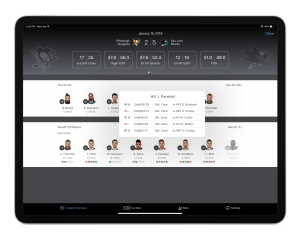NHL About To Enter New Era of Statistical Insight via On-Bench App Developed by League, Apple, SAP
The app on iPad Pros provide access 60+ real-time player, team stats
Story Highlights
The NHL All-Star Game this weekend may mark the end of an era for the game. In early February, NHL coaching benches will have a new technology tool: Apple iPad Pros powering an app developed by the NHL, SAP, and Apple will give coaches access to more than 60 real-time individual and team statistics.

NHL coaching will take a step forward when iPads on the bench deliver improved stats and player information to coaches in real time.
“Video coaches have been very passionate and excited about this,” says Robert Bendi, VP, strategic customers, Innovative Business Solutions, SAP North America. “They see an immediate impact for management of time on the ice. A number of clubs will proactively manage that and want to keep players on the ice for 20 minutes or less. Until now, people have been keeping their own statistics on sticky notes or having it radioed down from the press area, but, with this, they can see if a player is trending in or out of tolerance.”
Coaches, for example, will be able to adjust the time for each player individually, and a red warning graphic pops up to let the coach know when that player is past the limit.
Another application is the ability to see quickly how a player has done in face-offs, allowing the coaching staff to make more-informed decisions late in the game. They can see how successful the player was in face-offs in the offensive or defensive zone as well as in the past five face-offs.
“This is a really interesting solution for SAP, and we have an amazing heritage,” says Bendi. “Not many people know that we can build on-bench applications for the fastest team sport in the world. So the power of SAP, our HANA database, and the power of the application offer a speed to this database that, even five years ago, no one would have envisioned.”
He adds that concepts have been in the works for more than a year and a handful of clubs helped provide feedback on the initial release during first quarter 2018. Then, a joint workshop with SAP, Apple, and leading NHL coaches refined the mockups, and, through the summer and fall, it was finalized with the league. In the fourth quarter, it was put to the test, and final training for the system is set for after the All-Star Game.
Driving the app will be the statistics currently captured at the arena by NHL officials via tablets and sent to the NHL stats database, which is managed by SAP.
“Typically,” says Bendi, “within one or two seconds of being captured, this application will take that database and pull information out of it and render it on the iPad.”
Coaches can expect 35 stats concerning the whole team, individual players, and opponents to be available, including shot attempts, unblocked shot attempts, chances for and against, and success rate on shootouts with forehand shots and backhand shots. In addition, 11 game reports generated by the league during the game will be available electronically via the iPads.
“Some teams embrace technology more than others,” says Bendi of the expected rollout of the system across the league. “But what we will see is that teams using this capability will learn how to maximize it.”
Earlier this month, the NHL tested player- and puck-tracking during a game in Las Vegas, and the app has been architected so that data from the sensors on the players and the optical-tracking technologies can be made available. At that point, factors like a player’s acceleration, distance travelled on the ice, and more will be available to help with coaching decisions.
“Coaches will want to use this as a way to find that extra 10% that will make a difference between making the playoffs and winning the Stanley Cup,” says Bendi. “It’s about the speed and way we can simplify data and provide insight. You don’t want to overload the coaching staff with data to the point that it becomes noise. You need to boil it down to meaningful information that they can act on.”
